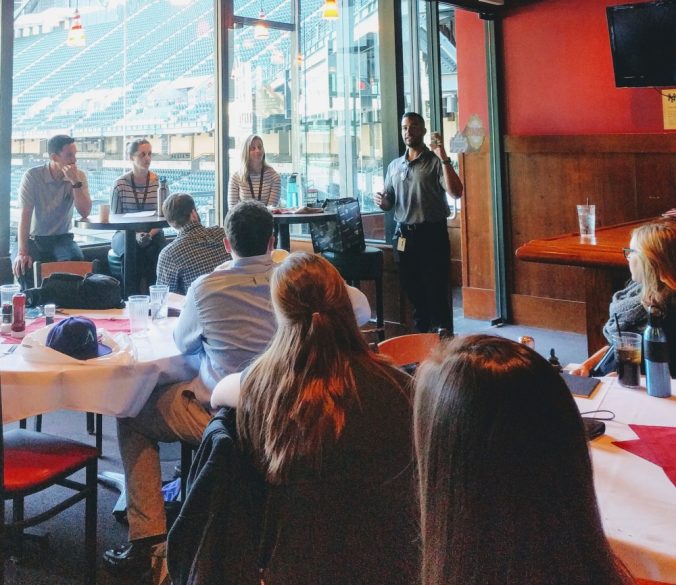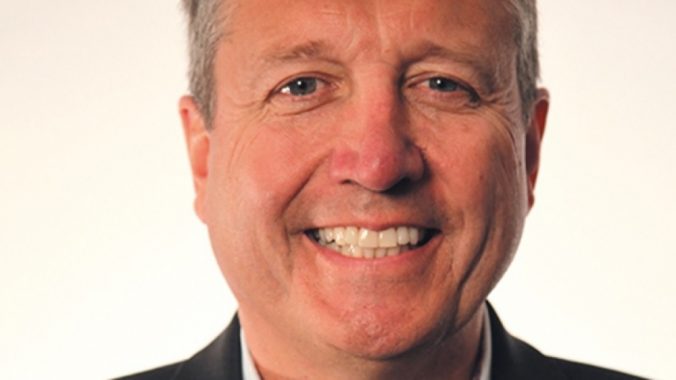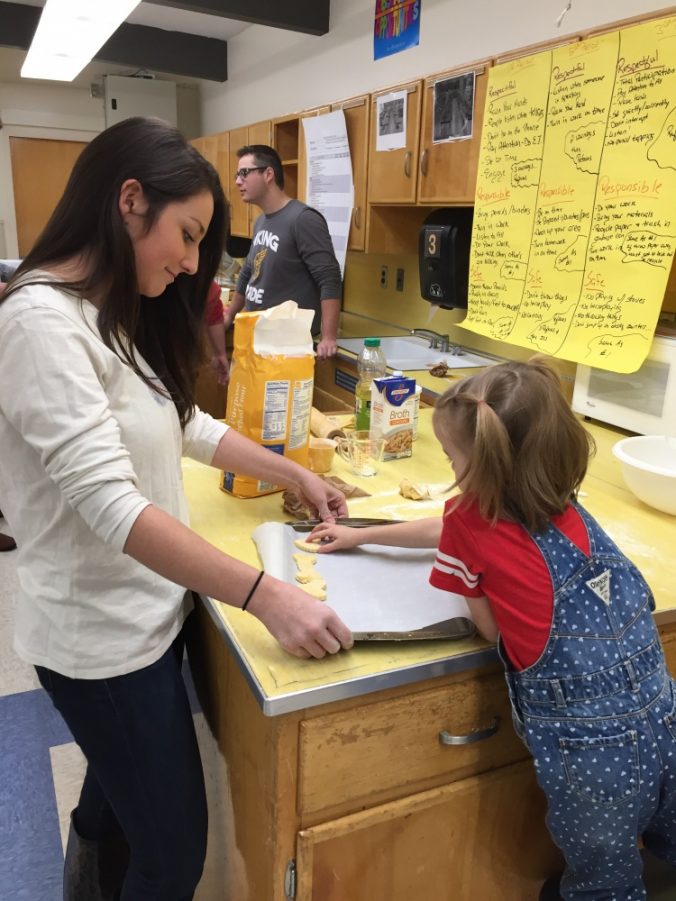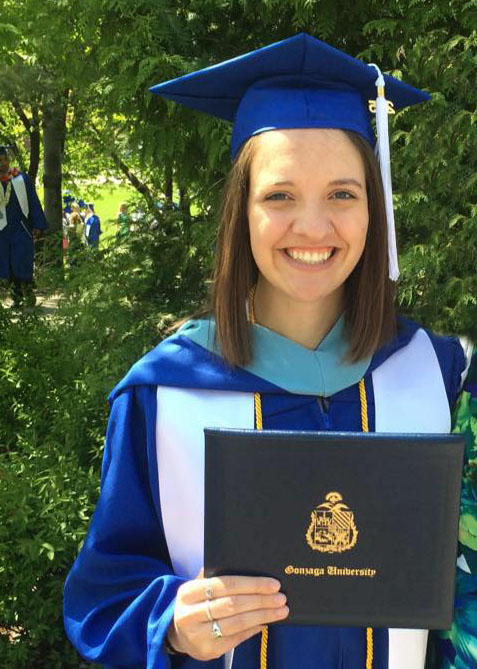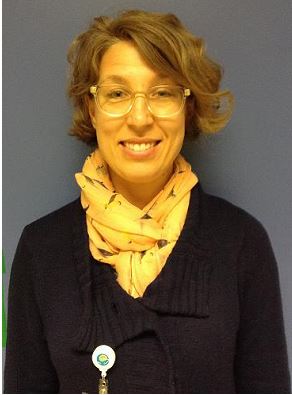- Tell us about yourself: My name is Brendan Sabean, class of 2014 and I earned my degree in Bachelors of Education.
- What are you doing now? I currently coach men’s basketball at Grand Canyon University and serve as the Special Assistant to the Head Coach. My role includes player development, preparation of practice and game plans, pre- and post-game video analysis and editing. As well as creating scouting reports of opponents.
- Why did you choose a program in the School of Education at Gonzaga? I originally started as a Business Major and knew in my sophomore year that it was not what I wanted to do. I knew I wanted to spend my life working in basketball and wanted to pursue coaching. I then change my major to physical education because I knew the lessons I learned would correlate directly coaching and teaching through sport.
- What influenced you the most during your time at Gonzaga? While I was at Gonzaga I had two major influences. The first was Dr. Jerry Krause, whom I met while working as a student manager for the men’s basketball team. Coach Krause was our director of operations and immediately he and I formed a strong bond. Each day at practice we would talk about everything, life, school, basketball. As a lifelong teacher himself, he always wanted me to become a teacher. He was my main influence for my switch from business to education. I can still remember the day I switched my major and told Coach Krause, he was so ecstatic and proud of me. I always looked to him as a mentor and grandfather like figure. Even today when we talk I always make sure to tell him I love him and thank him for being such a great influence on my life. The second influence was Dr. Rickel. When I wanted to switch my major I had no idea how to go about it. She took me under her wing and really allowed me to settle into my new major and new classes. She was by far the coolest teacher I had and was someone I consider a friend. Her kindness and open heart is what makes the school of education special.
- What was your greatest lesson learned at Gonzaga? The greatest lessons I learned at Gonzaga are to be yourself and to surround yourself with good, quality people. Gonzaga has such a strong sense of family and I believe that environment allowed me to be myself and grow into the person I am today.
- What is the most rewarding aspect of working in your field? Most challenging? The most rewarding aspect of coaching basketball at the college level is connecting to the players and seeing them grow not only as players, but also as people off the court. Being a part of a college student’s development as a person is a very rewarding feeling. In coaching you encounter people from all walks of life, from all over the world, and getting to create bonds with people who may be similar to you or nothing like you is special. The most challenging is earning the complete trust of a college student that you have nothing in common with and showing them that you care for them as not just a basketball player, but more so as a person.
- What critical issues do you see that need to be addressed in your field? College basketball is at a point where the integrity of the game is in question. We need to get back to our good morals and make this game about the student athlete’s growth as players and people, rather than worrying about the money and profits that can be made off of players, schools, etc.
- What advice do you have for future education professionals? I would say to go into your major with an open mind and willingness to learn from everyone you encounter. Take time to get to know those around you in all of your classes because you never know where that person may end up. Some day they may be in a position to help you out. Some day they may be reaching out to you for help. Gonzaga is a special place, full of special people. Embrace the fact you are part of something unique because I can guarantee you will make memories and learn lessons that will last a lifetime.
Page 4 of 9
This is the first part in a three-part series. To read part II, click here. To read part III, click here.
A brief connection often goes a long way. The world of networking may seem like an overwhelming one, but it certainly helps connect oneself to a number of opportunities.
Here at Gonzaga University, Assistant Professor in the Department of Sport and Physical Education, Dr. Jimmy Smith, holds the world of networking in a high regard. He works to expose his students to a variety of networking opportunities. Through connections with a company called Tremont Global Education, Smith took a group of students to Phoenix, AZ, last spring, giving them the opportunity to interact with people from the Phoenix Suns (NBA), Phoenix Coyotes (NHL), and Arizona Diamondbacks (MLB), along with attending Major League Baseball Spring Training. Through further connection with Gonzaga baseball alumnus, Anthony Synegal, the group also met with the marketing executive for the Arizona Cardinals (NFL).
“We show up and we talk to executives and ask, how do I get these jobs? What do I need to do? Whose hands do I need to shake?” Smith said. “It makes a lot of sense for the students when they’re hearing it from different people.”
Fast forward to June 2017, Dr. Smith connected again with an individual from Tremont Global named Scott Gray. The two discussed the curriculum of the Sports and Fitness in the Digital Age class here at Gonzaga, and the focus on the use of technology in the sports industry. After further discussion, Gray mentioned his connections with the Kansas City Royals and the challenges they face.
The Royals (along with all Major League Baseball teams) have representation in the Dominican Republic. Gray connected Smith with them, specifically their liaison, Jeff Diskin, Director of Cultural Development for the Kansas City Royals, who is responsible for preparing prospects to make the jump to the Major League in the United States. These players often lack a basic understanding of cultural differences, and their success hinges on developing that basic understanding.
“They need help understanding something as simple as doing laundry, opening a checking account, leaving a tip at a restaurant, or even ordering at a restaurant,” Smith said.
After connecting with the Royals and examining the curriculum and projects of the Sports and Fitness in the Digital Age class, GU students decided to take on a semester long project in which they create video content for the Royals’ athletes who are transitioning from the Dominican Republic. The players can watch these videos to prepare for their transition to play in the United States.
The trip to Phoenix last spring worked as a networking springboard that eventually connected GU to this project. Networking plays a big role in discovering exclusive projects like this.
“When you’re a college student, you get into these bubbles. But I think one of the greatest opportunities is to get outside of that comfort level, because once you leave college, that’s exactly what you’re going to have to do,” Smith said.
This is why Dr. Smith strives to organize similar trips. These trips give students an opportunity to escape the bubble and connect with professionals in the industry. The goal is to not only help students learn how to talk to people, but understand how talking to people can lead them to different opportunities and future projects. The trips emphasize interaction with professionals to create the connections that eventually springboard into something bigger – the same way Smith’s connections with Tremont Global eventually connected him to the Royals.
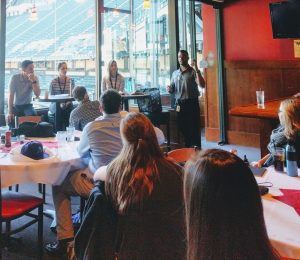
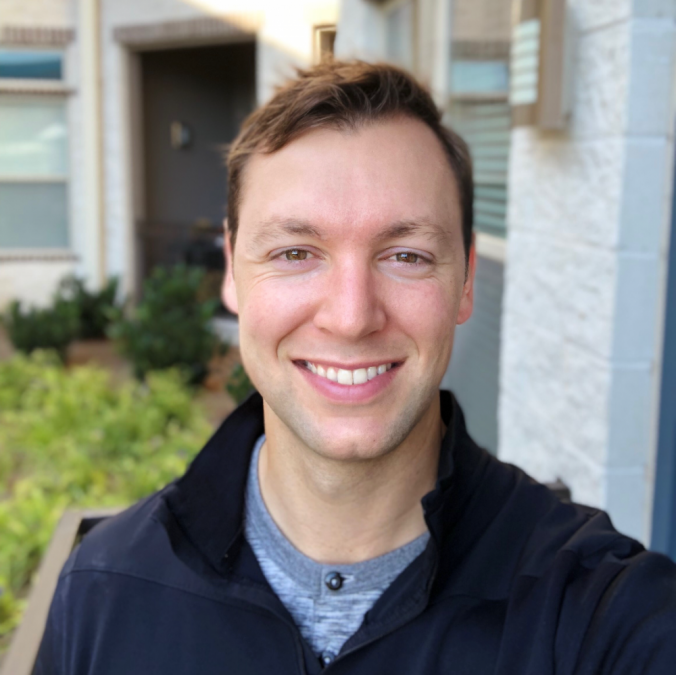
Alumni Spotlight: Steve Ames, Sport & Physical Education, ’15
- Tell us about yourself: My name is Steve Ames. I earned a B.Ed. in Sport Management. I transferred to Gonzaga in the fall of 2008 from Columbia Basin College. I finally graduated in 2015 after slowly working toward my degree while playing professional baseball for both the LA Dodgers (2009-2013) and Miami Marlins (2013-2015).
- What are you doing now?: Currently I work for the Tampa Bay Rays as an area scout. I primarily scout amateur players at the high school and college levels. I currently live in Nashville, TN. My area consists of the entire state of Tennessee, Alabama down to Montgomery, and a small portion of western Kentucky.
- Why did you choose a program in the School of Education at Gonzaga? Sports have always played a huge role in my life and I had always planned on working in the sport industry in some form after my playing days were over. A degree in sport management seemed like an obvious choice and the program at Gonzaga is highly respected.
- What influenced you the most during your time at Gonzaga? Well first let me say, I met my eventual wife Allyson Powell at Gonzaga, a former volleyball player. There have been many teammates and coaches, who have had an obvious influence on my life as well. The School of Education department truly has a family atmosphere. Dr. Karen Rickel has had the greatest influence in my educational experience at Gonzaga. She was my advisor for the majority of my time at GU, and was always available to answer any questions. I can honestly say without her, I don’t know if I would have followed through and finished my degree after getting drafted. Dr. Heidi Nordstrom, Dr. Tunnell, and Dr. Park all worked with my unique schedule and were vital to my success as I slowly worked toward my degree.
- What was your greatest lesson learned at Gonzaga? Just because the COG always has dessert, doesn’t mean you need to take one every meal.
- What is the most rewarding aspect of working in your field? Most challenging? The most rewarding aspect of scouting is watching guys you draft work their way through the minor leagues and get that call up to the Major Leagues. That’s what this job is all about, signing big league players. The most challenging aspect is just that, trying to get the sign the right guys. There is no perfect science to scouting, and that’s why it is so rewarding when you find big leaguers. Especially when they are later round drafts that you have a gut feel about.
- What critical issues do you see that need to be addressed in your field? I wouldn’t call the use of analytics a critical issue, but it continues to grow. Its use affects how the game is played, and how players are evaluated. Scouts must continue to adapt to the use on technology like Pitch FX and Trackman in ballparks across the country. The use of analytics is a great tool to help evaluate and make decisions, but there is a human element to our game. It will be interesting to see how the use of analytics evolves over the next 10 years and beyond.
- What advice do you have for future education professionals? Persistence pays off, which can be said for any profession. If you want something bad enough, go get it, keep chipping away until you reach your goal. I took 1 class per semester for 5 years and then was able to come back and finish. A college degree meant a lot to me. I was the first person in my family to earn one, and while they aren’t everything, I knew it would help me get a career once I was finished playing.
Athlete, firefighter, lawyer, leader.
These words describe Bill Smith of Calgary, Alberta. After a career in football with the Calgary Dinos team, for which he was a part during their Vanier Cup win in 1985, Smith decided to make a career change and become a firefighter.
Seeking leadership advancement in the job he loved, Smith approached his superiors only to find out that he needed higher qualifications.
Along with his wife Mary, Smith enrolled in Gonzaga’s Master’s in Leadership and Administration in the 1997-1999 Calgary cohort. Surprisingly, after earning his degree, he was told that he was now overqualified for a higher position.
Smith decided to resign and instead pursue a law degree. After graduating with a Bachelor of Laws from the University of Calgary in 2003 and articling at Parlee McLaw, he and Dave Findlay, his partner, took over the law practice of Bruce Miller.
In June of 2016, Smith opened his own boutique law firm, Law Shop – Legal Easy, that supports small and medium sized companies with affordable prices.
This year, Smith used his top-notch leadership skills to run for Mayor of the city of Calgary. Although he lost in the October 16 election, he proved to be a candidate strong in leadership and vison for his beloved city.
On November 4, 2017, the School of Education (SOE) held its first ever Day of Service. Over 30 SOE students, staff, faculty and alumni gathered on a chilly Saturday morning at Shaw Middle School. There, they joined forces with teachers and students from Shaw to complete several community services projects.
Volunteers walked across the street to Northeast Community Center (NECC), where together they painted an underutilized wall and transformed it into a massive chalkboard. The group toured NECC and learned about its vast range of community resources and current initiatives.
After the chalkboard painting project was completed, Day of Service participants returned to Shaw’s campus. They created school spirit signage to liven up the school’s gymnasium, and collaborated to bake hundreds of dog biscuits to be donated to the Spokane County Regional Animal Protection Service (SCRAPS).
The Day of Service concluded with volunteers sharing a meal together and building relationship between Gonzaga and local Spokane school community.
View some photos from our Day of Service below:
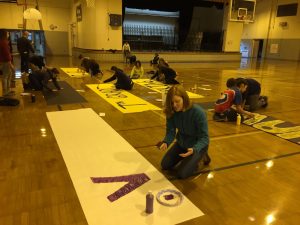
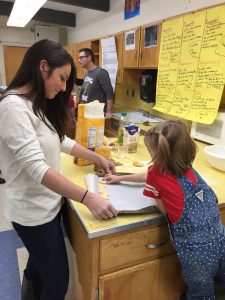
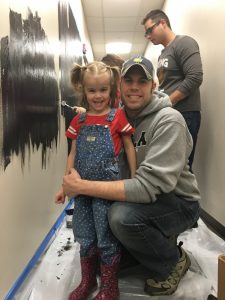
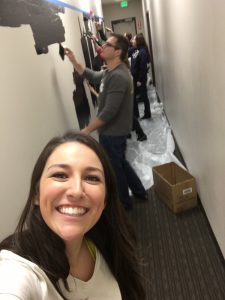
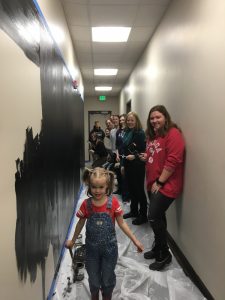
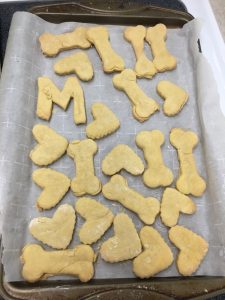
What is your name, which degree did you earn, & what year did you graduate?
Clare Greaney
Majored in Special Education and got an Elementary Endorsement
Graduated in 2015
What is your current occupation or role?
4th-6th grade resource room teacher at Arlington Elementary in Spokane
Why did you choose a program in the School of Education at Gonzaga?
By the time I was looking at colleges, I had known for a few years that I wanted to be a teacher. I wanted to be able to graduate in four years with a teaching certificate, and I wanted to be able to begin working in the schools early in my program. Gonzaga was the only college I looked at that offered both of these things. When I visited Gonzaga the summer before my senior year of high school, a professor from the School of Education took the time to sit down with me and really explain how the program worked. Both the conversation and the fact that a professor cared enough to help me make my decision made it clear to me that Gonzaga was the best fit.
What, or who, influenced you the most at Gonzaga? Please share as much as you are willing.
Tim McLaughlin influenced me most at Gonzaga. My freshman year of college I was never completely sure if Special Education was the right fit for me, and I planned to teach in a general education setting. Tim became my advisor my sophomore year and I also began taking classes from him that year. My junior year I took his Behavior Disorders class, which was my favorite class in college and really helped me discern that I did want to be a Special Education teacher. Working with students who need support with their behavior is my favorite part of my job, and it is because of Tim McLaughlin that I first got interested in this aspect of teaching.
What is the most rewarding aspect of working in your field? Most challenging?
The most rewarding aspect of being a resource room teacher is creating a space where struggling learners feel safe, supported, and successful. My students often struggle to keep up in class, and many of them feel defeated by the fact that they aren’t able to do everything their peers can. Being able to show them that they are making academic progress and celebrating their successes and strengths is one of my favorite parts of my job.
The most challenging aspect of working in my field is the lack of resources. Special Education programs are often understaffed and have high staff turnover, and both of these things make my job more challenging and creates a less stable environment for my students. I teach in a Title 1 school, so many of my student are not having basic needs met at home and therefore require a higher level of support at school.
What critical issues do you see that need to be addressed in your field?
I think more of an emphasis needs to be placed on mental health, both in schools and in teacher training programs. The mental health of students has a huge impact on how well they are able to function at school, both behaviorally and academically. While there are some supports for this in the school I work at, I think that we need to be doing more to support our students with mental health issues. I also believe more should be done to prepare teachers to be effective with students with mental health issues.
What advice do you have for future education professionals?
I would advise future education professionals to learn how to take good care of themselves. Teaching can be incredibly rewarding, but it can also be incredibly exhausting. One of the most important things I have had to learn since I began teaching is how to disconnect myself from the job and recharge, so that I can go back the next day and be at my best.
- Tell us about yourself: Christy Swan. I completed Principal Certification in 2016
- What are you doing now?: Assistant Principal of Chester and Ponderosa Elementary in Central Valley School District
- Why did you choose a program in the School of Education at Gonzaga? Not only does Gonzaga have a stellar reputation for education, it also met my needs for earning my certificate while teaching and completing an internship. The pace of the program was ideal, allowing me to finish my work in a year.
- What influenced you the most during your time at Gonzaga? Dr. Cynthia Johnson had a huge impact on my work. She pushed my thinking and offered experiences that challenged me while also helping to develop my confidence in school leadership. Cindy was supportive, encouraging, and without a doubt an advocate for all in the program. It was, and still is, her main focus that all candidates leave ready to enter the field of school leadership and do so with passion and excitement.
- What was your greatest lesson learned at Gonzaga? The greatest lesson I learned at Gonzaga was the power of a cohort. I believe working through the program with others was pivotal in helping me feel supported and engaged. We were all able to share experiences, grow one another’s thinking, and celebrate our successes.
- What is the most rewarding aspect of working in your field? Most challenging? Hands down, the most rewarding part of working in my field is serving others. It is my “why.” My purpose for coming to work each day is to serve those around me and to ensure that their needs are met. I am lucky enough to work with amazing students, teachers, support staff, administrators, parents, and community members. The most challenging part of my job is there are not nearly enough hours in the day to do all I believe is necessary to fulfill my role. With that challenge, I have learned to balance my time prioritize my “to do” and enjoy the ride!
- What critical issues do you see that need to be addressed in your field? A critical issue I believe that needs to be addressed in education is the mental health of students. We serve many students of complex trauma and other outside factors that need support. Currently, we are limited in all that we can do to help these young kids.
- What advice do you have for future education professionals? Make sure you know your “why.” It guides you in all that you do.
This is the third and final part in a series featuring the value of a cohort-based approach to graduate education.
Dr. Elaine Radmer spent the last two years advising a group in Fernie, British Columbia. The Fernie cohort perfectly highlights the value of Gonzaga’s site-based approach. “All but one of the educators were from a single school district, but that district spans a number of communities,” Dr. Radmer wrote. “Geographically, they are spread along a single highway, but it takes almost two hours to travel between the outermost cities.” Candidates from the cohort have a story to tell about the way the program transformed their educational practices and philosophy.
- Penny did her capstone on improving the experience for athletes through recognition dinners and social media. This rejuvenated her passion for the role she plays as athletic director. On paper, it seems like a small part of her job, but in reality, it is a huge commitment. Her capstone work led to many more plans for improvement – coaching clinics, sports camps, etc… Additionally, in an effort to involve the community in sports programs, she created the first alumni basketball game, which has become a highly successful fundraiser.
- Jill continued her work as leader in school literacy goals, working on a collaborative literacy grant with colleagues. They implemented two school-wide initiatives. The first, “Storm Reads Challenge,” set a school wide goal of reading 500 books (which they exceeded) and featured grade level competitions (Grade 7 read more books than any other grade). The second, “Storm Reads Week,” saw every human in the school spend 15 minutes reading during an assigned time.
- Leanna implemented the “MindUp” program in Kindergarten/Grade 1 class. It is a social-emotional learning program to teach mindfulness and improve self-regulation. Their class made a Gratefulness tree bulletin board and invited anyone at the school to add a leaf so it would grow over time.
- Kathy has started to work with Grade 4 through Grade 6 students at her school to apply math in designing a garden housed at the school.
- Andrew started making movies to highlight student achievement. He started with his own classes, but now has a leadership role across the school — gathering videos and pictures and posting “highlight reels” on school websites.
- Renee is a Kindergarten teacher who is passionate about student activity levels. She developed and delivered materials to help kids at all grade levels understand options for being active at recess and expectations for their behavior (e.g., problem solving rather than fighting, etc.). Due to her efforts, kids became more active at recess and teachers reported fewer behavioral problems. She also implemented several other school-wide initiatives. She changed the volleyball approach to Triple Ball, which gives younger kids more chances to play and gain skills. To do this, she gained approvals from senior management, and then collaborated with a local college to provide training. Ultimately, she organized a district tournament that was a hit in the community. She also implemented a Golden Shoe challenge to inspire everyone to ride, bike, scooter, or walk to school.
- Ian created a collaborative, school-based team that launched an initiative to explore inter-curricular inquiry-driven projects. They changed the bell schedule to create “Inquiry Fridays” for project-based learning. On Fridays, three teachers from different subjects worked together on grade-wide inquiry teams. Ian’s background and expertise as an outdoor education instructor was helpful to support this initiative. In addition, Ian stepped into leadership by organizing activities: staff events, school-wide track-and-field event, and a field trip to Calgary for cultural experience for students in Social Studies and English.
- After deciding to commission an art piece as a focal point at the school’s entryway, Jane collaborated with the staff and allowed the plan to evolve until the artwork represented the recent combination of two schools into one. She raised over $3,000 for this project. The unveiling will be in the fall. She also wrote a grant for a collaborative project to build a greenhouse at their school. As an inquiry project, students filled out the permit application, drew up plans, and decided how to heat the greenhouse.
Check out our first post in this series: Alumni in Action: The Elk Valley Arch
Check out our second post in this series: Alumni in Action: The Rainbow Crosswalk Project
- Tell us about yourself: I received both my B.Ed. and M.Ed. in Special Education, 2002 and 2008 respectfully, from Gonzaga University. I received my PhD in School Psychology from the University of Iowa in August of 2016.
- What are you doing now?: I am currently a psychology fellow at the Seattle Children’s Autism Center working in the Biobehavioral and the ABA Early Intervention programs. I specialize in assessing and treating challenging behaviors that often are associated with autism and other disabilities. I have accepted a position with the Child Development Center in Missoula, MT and I will start in October 2017.
- Why did you choose a program in the School of Education at Gonzaga? At the beginning, I just wanted to be at Gonzaga University and I was undecided between majors and academic programs. I was involved in several sports when I was younger and I thought coaching would eventually be in my future. Most of my former coaches were teachers so registered for my first education class with Dr. Tim McLaughlin. I remember loving the discussions in that class and he inspired me to pursue special education. The next semester, I registered for applied behavior analysis (ABA) with Dr. Randy Williams. ABA was life changing for me. Understanding and analyzing the concept of learning through the principles of reinforcement and punishment made intuitive sense to me. I knew I was in the right program after taking that course!
- What influenced you the most during your time at Gonzaga?Each member of the faculty reach out to me, taught me critical skills, and believed in me in different ways throughout my Gonzaga career. Tim was influential in getting me started down the path of special education and for advising throughout my undergrad. Randy was influential in teaching me the foundational principles of ABA and modeling ABA in his teaching. Mark (Derby) was influential by convincing me to pursue my masters at a time when I was so unsure of what to do with my life. Kim (Weber) is influential by modeling leadership and advocacy, not only for the population of students that special educators serve, but for her undergrad and graduate students. Anjali (Barretto) was influential by simultaneously modeling passion for our science and compassion for all the children who walk in our doors. She was also instrumental in my choice to pursue my PhD at University of Iowa and to work with Dave Wacker. It was the most difficult, but by far the most rewarding choice of my life.
- What was your greatest lesson learned at Gonzaga? Gonzaga taught me several valuable lessons two of which come immediately to mind. First, I learned is that Gonzaga will always be a second home and Gonzaga’s faculty, staff, and fellow alumni are family. Between graduating from Gonzaga with my bachelor’s and coming back to earn my master’s, I sustained a life-changing traumatic brain injury (TBI). I was at St. Luke’s Rehabilitation and Deaconess for several weeks. But the time went by fast because I had so many visitors. Tim and Randy among them. As soon as I could, I began volunteering at Gonzaga as a rowing assistant coach and would walk across campus to visit the SPED faculty regularly. I was always welcome at Gonzaga! Learning how to navigate the world of disability while showing individuals their true abilities was the second lesson I Iearned at Gonzaga. From writing an individual education plan (IEP) to researching rare genetic syndromes, I learned that that the word “disability” is multi-faceted. At the same time, every individual has amazing abilities.
- What is the most rewarding aspect of working in your field? Most challenging? Strength: Seeing the growth in a child and showing parents their child’s strengths through your data. For example, I recently saw a 5-year-old girl with destructive behavior. Her mother just wanted to keep her safe. We implemented a play intervention to teach her to play with her toys instead of throwing them and the outcomes were successful. Her mother was brought to tears when she saw her daughter playing and said, “she has never done that before!”Challenge: Keeping up with the need.
- What critical issues do you see that need to be addressed in your field? Making quality services more accessible.
- What advice do you have for future education professionals? “When in doubt… persist, don’t punt.” A quote from Dave Wacker.
This is the second part in a series featuring the value of a cohort-based approach to graduate education.
Dr. Elaine Radmer spent the last two years advising a group in Fernie, British Columbia. The Fernie cohort perfectly highlights the value of Gonzaga’s site-based approach. “All but one of the educators were from a single school district, but that district spans a number of communities,” Dr. Radmer wrote. “Geographically, they are spread along a single highway, but it takes almost two hours to travel between the outermost cities.”
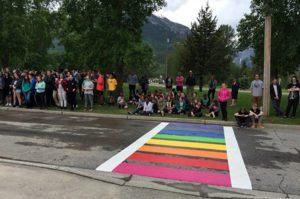
The Rainbow Crosswalk in Fernie. Shared from e-know.ca
Inspired to undertake additional project with students to improve their communities, Tara and Janet spearheaded the Rainbow Crosswalk project in Fernie, BC. In her role supervising the Student Council, Tara was able to mobilize the students. The project unfolded over months, as community experts came to school, students taught lessons to peers, and they presented to school and city boards. The project culminated with the painting of a crosswalk by the high school and four additional crosswalks in the downtown area to promote inclusion. Local media covered the project:
https://www.e-know.ca/regions/elk-valley/fernie/first-rainbow-crosswalk-opened/
Check out our first post in the series: Alumni in Action: The Elk Valley Arch
